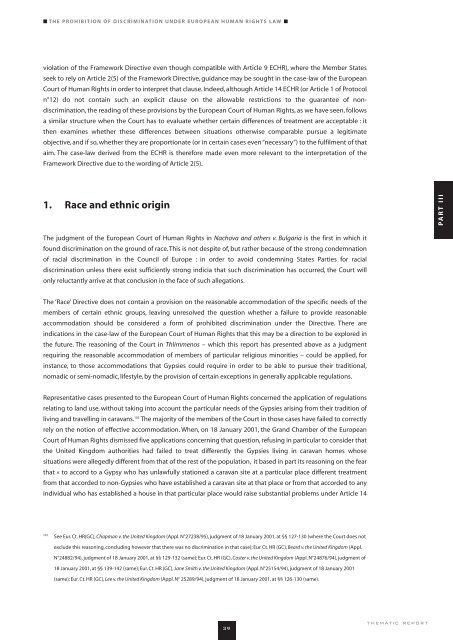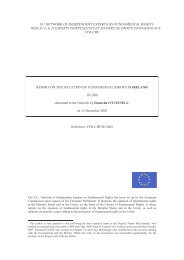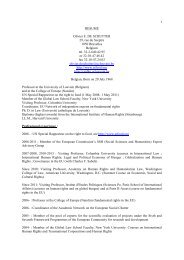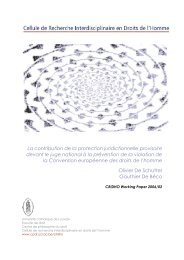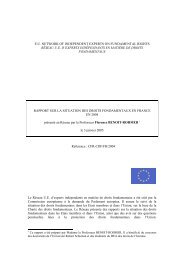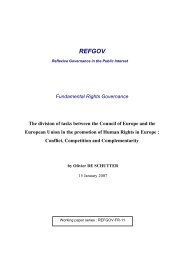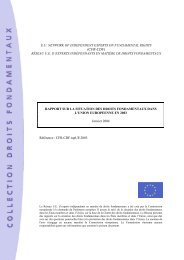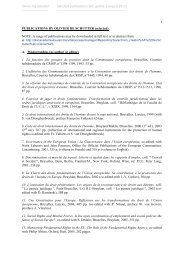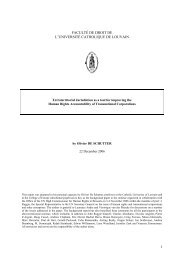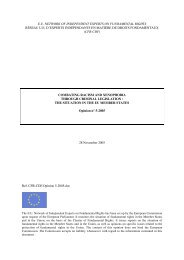The Prohibition of Discrimination under European Human ... - cridho
The Prohibition of Discrimination under European Human ... - cridho
The Prohibition of Discrimination under European Human ... - cridho
Create successful ePaper yourself
Turn your PDF publications into a flip-book with our unique Google optimized e-Paper software.
■ THE PROHIBITION OF DISCRIMINATION UNDER EUROPEAN HUMAN RIGHTS LAW ■<br />
violation <strong>of</strong> the Framework Directive even though compatible with Article 9 ECHR), where the Member States<br />
seek to rely on Article 2(5) <strong>of</strong> the Framework Directive, guidance may be sought in the case-law <strong>of</strong> the <strong>European</strong><br />
Court <strong>of</strong> <strong>Human</strong> Rights in order to interpret that clause. Indeed, although Article 14 ECHR (or Article 1 <strong>of</strong> Protocol<br />
n°12) do not contain such an explicit clause on the allowable restrictions to the guarantee <strong>of</strong> nondiscrimination,<br />
the reading <strong>of</strong> these provisions by the <strong>European</strong> Court <strong>of</strong> <strong>Human</strong> Rights, as we have seen, follows<br />
a similar structure when the Court has to evaluate whether certain differences <strong>of</strong> treatment are acceptable : it<br />
then examines whether these differences between situations otherwise comparable pursue a legitimate<br />
objective, and if so, whether they are proportionate (or in certain cases even “necessary”) to the fulfilment <strong>of</strong> that<br />
aim. <strong>The</strong> case-law derived from the ECHR is therefore made even more relevant to the interpretation <strong>of</strong> the<br />
Framework Directive due to the wording <strong>of</strong> Article 2(5).<br />
1. Race and ethnic origin<br />
<strong>The</strong> judgment <strong>of</strong> the <strong>European</strong> Court <strong>of</strong> <strong>Human</strong> Rights in Nachova and others v. Bulgaria is the first in which it<br />
found discrimination on the ground <strong>of</strong> race. This is not despite <strong>of</strong>, but rather because <strong>of</strong> the strong condemnation<br />
<strong>of</strong> racial discrimination in the Council <strong>of</strong> Europe : in order to avoid condemning States Parties for racial<br />
discrimination unless there exist sufficiently strong indicia that such discrimination has occurred, the Court will<br />
only reluctantly arrive at that conclusion in the face <strong>of</strong> such allegations.<br />
<strong>The</strong> ‘Race’ Directive does not contain a provision on the reasonable accommodation <strong>of</strong> the specific needs <strong>of</strong> the<br />
members <strong>of</strong> certain ethnic groups, leaving unresolved the question whether a failure to provide reasonable<br />
accommodation should be considered a form <strong>of</strong> prohibited discrimination <strong>under</strong> the Directive. <strong>The</strong>re are<br />
indications in the case-law <strong>of</strong> the <strong>European</strong> Court <strong>of</strong> <strong>Human</strong> Rights that this may be a direction to be explored in<br />
the future. <strong>The</strong> reasoning <strong>of</strong> the Court in Thlimmenos – which this report has presented above as a judgment<br />
requiring the reasonable accommodation <strong>of</strong> members <strong>of</strong> particular religious minorities – could be applied, for<br />
instance, to those accommodations that Gypsies could require in order to be able to pursue their traditional,<br />
nomadic or semi-nomadic, lifestyle, by the provision <strong>of</strong> certain exceptions in generally applicable regulations.<br />
Representative cases presented to the <strong>European</strong> Court <strong>of</strong> <strong>Human</strong> Rights concerned the application <strong>of</strong> regulations<br />
relating to land use, without taking into account the particular needs <strong>of</strong> the Gypsies arising from their tradition <strong>of</strong><br />
living and travelling in caravans. 103 <strong>The</strong> majority <strong>of</strong> the members <strong>of</strong> the Court in those cases have failed to correctly<br />
rely on the notion <strong>of</strong> effective accommodation. When, on 18 January 2001, the Grand Chamber <strong>of</strong> the <strong>European</strong><br />
Court <strong>of</strong> <strong>Human</strong> Rights dismissed five applications concerning that question, refusing in particular to consider that<br />
the United Kingdom authorities had failed to treat differently the Gypsies living in caravan homes whose<br />
situations were allegedly different from that <strong>of</strong> the rest <strong>of</strong> the population, it based in part its reasoning on the fear<br />
that « to accord to a Gypsy who has unlawfully stationed a caravan site at a particular place different treatment<br />
from that accorded to non-Gypsies who have established a caravan site at that place or from that accorded to any<br />
individual who has established a house in that particular place would raise substantial problems <strong>under</strong> Article 14<br />
103<br />
See Eur. Ct. HR(GC), Chapman v. the United Kingdom (Appl. N°27238/95), judgment <strong>of</strong> 18 January 2001, at §§ 127-130 (where the Court does not<br />
exclude this reasoning, concluding however that there was no discrimination in that case); Eur. Ct. HR (GC), Beard v. the United Kingdom (Appl.<br />
N°24882/94), judgment <strong>of</strong> 18 January 2001, at §§ 129-132 (same); Eur. Ct. HR (GC), Coster v. the United Kingdom (Appl. N°24876/94), judgment <strong>of</strong><br />
18 January 2001, at §§ 139-142 (same); Eur. Ct. HR (GC), Jane Smith v. the United Kingdom (Appl. N°25154/94), judgment <strong>of</strong> 18 January 2001<br />
(same); Eur. Ct. HR (GC), Lee v. the United Kingdom (Appl. N° 25289/94), judgment <strong>of</strong> 18 January 2001, at §§ 126-130 (same).<br />
39<br />
thematic report<br />
PART III


